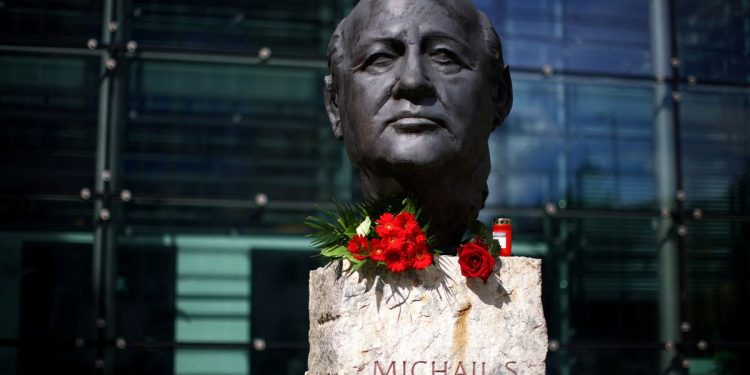No state honours or Putin presence planned for the funeral
Gorbachev’s reforms precipitated the end of the Soviet Union
Former leader stunned by Russian actions in Ukraine
This content was produced in Russia where the law restricts coverage of Russian military operations in Ukraine.
Mikhail Gorbachev, the Soviet leader who was much admired in the West and who lived long enough to see all the reforms he had championed undone, was set to be buried on Saturday without state honours or the presence of President Vladimir Putin.
Gorbachev, who died on Tuesday aged 91, has been granted a public send-off – Muscovites will be able to view his coffin in the imposing Hall of Columns, within sight of the Kremlin, where previous Soviet leaders have been mourned.
Ahead of his funeral, scheduled to start at 0700 GMT, pallbearers hoisted Gorbachev’s wooden coffin, covered in a tricolour Russian flag, into the venue.
But it was little surprise that Putin, a long-time KGB intelligence officer who has called the Soviet Union’s collapse a “geopolitical catastrophe”, denied Gorbachev full state honours and said his schedule did not allow him to attend the funeral.
Gorbachev became a hero in the West for allowing eastern Europe to shake off more than four decades of Soviet communist control, letting East and West Germany reunite, and forging arms control treaties with the United States.




But when the 15 Soviet republics seized on the same freedoms to demand their independence, Gorbachev was powerless to prevent the collapse of the Union in 1991, six years after he had become its leader.
For that, and the economic chaos that his “perestroika” liberalisation programme unleashed, many Russians could not forgive him.
GORBACHEV ‘CRUSHED’ BY UKRAINE EVENTS
The many Western heads of state and government who would certainly have come will be absent on Saturday, kept away by the chasm in relations between Moscow and the West opened up by Putin’s move to send troops into Ukraine in February.
Instead, ordinary Russians will file past the open coffin of the Nobel Peace laureate, whose guard of honour will provide an “element” of a state occasion, according to the Kremlin.
It will all be a far cry from the national day of mourning and state funeral in Moscow’s principal cathedral that was granted in 2007 to former Russian President Boris Yeltsin, who was instrumental in sidelining Gorbachev as the Soviet Union fell apart and later hand-picked Putin as his own successor. After the ceremony, Gorbachev will, however, be buried like Yeltsin in Moscow’s Novodevichy cemetery, alongside his adored wife Raisa, who died 23 years ago.
On entering the Kremlin in 2000, Putin wasted little time in rolling back the political plurality that had developed from Gorbachev’s policy of “glasnost”, or openness, and slowly began rebuilding Moscow’s influence over many of its lost republics.
Gorbachev’s long-time interpreter and an aide said this week that Russia’s actions in Ukraine had left the former leader “shocked and bewildered” in the final months of his life.
“It’s not just the operation that started on Feb. 24, but the entire evolution of relations between Russia and Ukraine over the past years that was really, really a big blow to him. It really crushed him, emotionally and psychologically,” Pavel Palazhchenko told Reuters in an interview.



Recent Comments